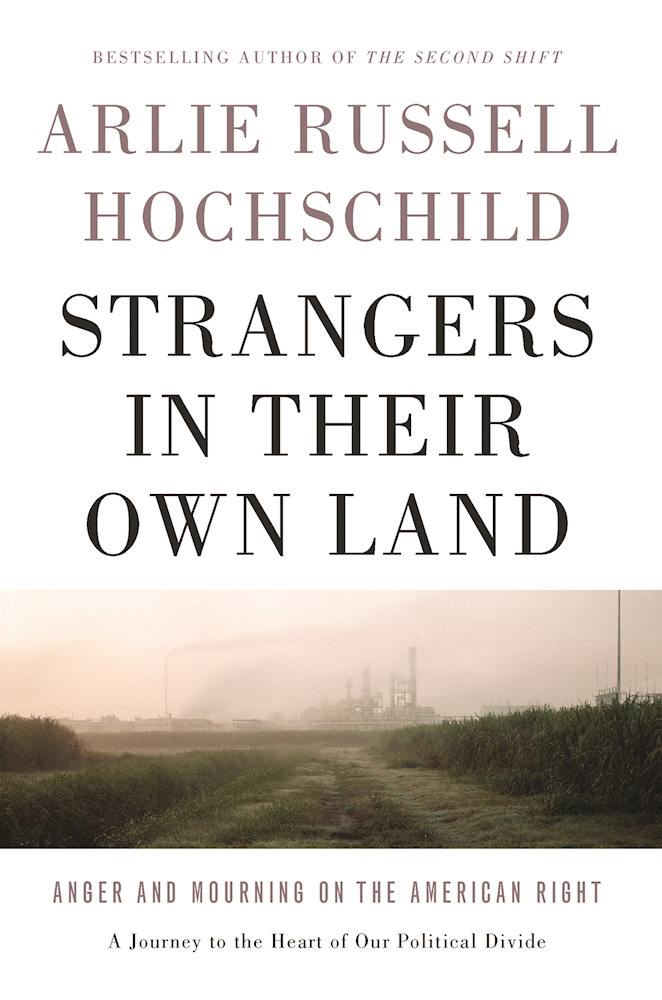What do you think?
Rate this book


242 pages, Hardcover
First published September 6, 2016
Waiting In line.Hochschild elaborates on this theme considerably more, but I think this is enough to get a feel for how this story unfolds. She reports that she read her story to a number of her interviewees, and they acknowledge that it accurately reflected their feelings. One of them said, "You took the words out of my mouth."
You are patiently waiting in a long line leading up a hill like a pilgrimage. You are situated in the middle of this line along with others who are older, white, Christian, and predominately male, some with college degrees, some not. Just over the brow of the hill is the American dream, the goal of everyone waiting in line. Many in the back of the line are people of color, poor young and old, mainly without college degrees. It's scary to look back there are so many behind you, and in principle you wish them well. Still you've waited a long time, worked hard, and the line is barely moving. You deserve to move forward a little faster. You're patient but weary. You focus ahead especially on those at the top of the hill. The American dream is a dream of progress, the idea that you're better off than your forebears just as they superseded their parents before you, and extends beyond money and stuff. You've suffered long hours, layoffs, and exposure to dangerous chemicals at work, and received reduced pensions. You have shown moral character through trial by fire and the American dream of prosperity and security is a reward for all of this showing who you have been and who you are, a badge of honor. The source of the American dream is on the other side of the hill, hidden. Has the economy come to a strange standstill? Is my company doing OK? Will I get a raise this year? Are there good jobs for us all, or just a few? Will we be waiting in line forever? It's so hard to see over the brow of the hill. The sun is hot and the line unmoving. In fact, is it moving backward? You haven't gotten a raise in years and there is no talk of one.
... ... ...
The Line Cutters
Look, you see people cutting in line ahead of you! You're following the rules, they aren't. As they cut in you feel as though you are being moved back. How can they just do that? Who are they? Some are black through affirmative action plans pushed by the Federal Government they are being given preferences in colleges and universities, apprenticeships, jobs, welfare payments, and free lunches. And they hold a certain secret place in people's minds ... ... ... Your money is running through a liberal sympathy sieve you don't control or agree with.
Trump jovially imitated a disabled journalist by physically shaking his arm in imitation of palsy—all deeply derogatory actions in the eyes of Trump’s detractors but liberating to those who had felt constrained to pretend sympathy. Trump allowed them both to feel like a good moral American and to feel superior to those they considered “other” or beneath them (228).Let me take this opportunity to be very un-PC—these people are assholes. There’s a world of difference between being sympathetic and being sorry for someone. There’s also a big difference between being indifferent/unsympathetic to actively deriving pleasure from mocking someone. I used to interact with a lot of handicapped students when I worked at a university library. Sometimes I had to fetch books for them, copy papers for them, put on their hats and zip up their coats. Some of these students couldn’t talk and communicated via slowly typed-out commands on computer keyboards. Dealing with the more physically-challenged students was unpleasant because they couldn’t communicate well and often they had food stains on their clothes and other examples of poor hygiene, probably because their money for personal attendants was limited. Was I sympathetic? I guess I was, because I’m not an asshole, but I didn’t feel sorry for them. I treated them like any other student, like human beings who deserve respect—not derision.
"Pollution is the sacrifice we make for capitalism."
During this era a long parade of the underprivileged came forward to talk of their mistreatment – blacks who had fled a Jim Crow South, underpaid Latino field workers, Japanese internment camp victims, ill-treated Native Americans, immigrants from all over. Then came the women’s movement. Overburdened at home, restricted to clerical or teaching jobs in the workplace, unsafe from harassment, women renewed their claim to a place in line for the American Dream. Then gays and lesbians spoke out against their oppression. Environmentalists argued the cause of forest animals without forests.